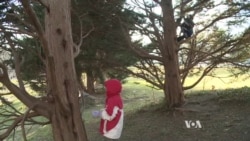Rafi and Dvora Meitiv like to play at their neighborhood park and walk home afterward – by themselves.
And that's the problem, says the local child protective services agency.
Rafi is 10 and his sister is 6, and their unsupervised adventures in a suburb of Washington, D.C., have triggered a national debate about different parenting styles.
Their parents support their independence, and defend their style of child-rearing some call "free-range parenting."
"The idea of free-range parenting is really that your children need the freedom to explore. They need to be alone, without parents, really just having fun as kids with other children out in the world," said their mother, Danielle Meitiv.
"When kids learn how to do things by themselves," she emphasized, "they learn to be independent, they learn to solve their own problems. It's a very, very natural part of growing up and in fact around the world it's still a natural part of growing up."
Stopped by police
But on a recent afternoon, on a longer-than-usual walk from the park to their home in Silver Spring, Maryland, local police officers stopped the children as they walked along a busy avenue and drove them home.
What happened next came as a shock to their father, Alexander Meitiv.
"When they brought them home, I thought they would release the kids -- it’s my house, my kids – but apparently they had some procedure to go through which required I give them my ID," he said.
"I assumed that I could just say 'thank you for bringing my kids home' – and take the kids home. They wouldn’t let me do it. They physically blocked me from approaching my kids," he said.
Rafi called his mother, who was out of town, and told her he was afraid his father would be arrested.
Child Protective Services
Alexander Meitiv was not arrested, but a few hours later, an investigator from Child Protective Services (CPS) showed up at the house.
He recalled the investigator had "a safety plan which required me to not leave my children unsupervised. She didn’t say it was a temporary plan. I’m going to have to sign something that changes the way I parent? I said, ‘No, I’m not going to do that’ and she said, ‘If you don’t do it, we’re going to take the kids right now’ and she called the police."
CPS opened an investigation based on a Maryland law that makes it illegal to leave a child younger than 8 with anyone under the age of 13.
But Danielle Meitiv said the law doesn't apply in this case.
"It says children cannot be left unattended while confined or locked in a building, dwelling, enclosure or vehicle," she said. "They were not locked or confined anywhere; they were outdoors playing in a playground or walking home.”
Children traumatized
The incident has left the parents angry and the children traumatized.
“The kids were very scared by the whole thing," Danielle Meitiv said. "When it first happened, my daughter was having nightmares about the police coming and taking daddy away."
Rafi said, "At first, I was just a bit annoyed because we know that they’re not allowed to do this and what we’re doing is allowed. And then I started to get kind of scared because I thought that maybe they would arrest my dad."
Danielle Meitiv said she remembers her own childhood, when she was allowed to go practically everywhere alone.
"Up until this generation, it was perfectly normal for children to go to the park by themselves or go down the block or run errands for their parents or walk home from school," she said. "It’s only very recently that this has become unusual."
Some parents disagree
But many parents disagree, saying that it's unsafe to leave children alone. They could be hurt or abducted, or worse, they say.
Holly Schiffrin, professor of psychology at the University of Mary Washington in Virginia, said she believes any extreme form of parenting is unhealthy.
Schiffrin has co-authored a book that discusses a style of parenting sometimes called over-protective or helicopter parenting.
"We think that when parents are parenting in that manner – really hovering and solving their children’s problems for them – that they’re sending an unintentional message to their kids in two ways," she said.
"One [is] that the child may not be competent to handle those problems on their own and the parent needs to step in and do that, and the other is they’re preventing their child from developing that competence because they’re not getting a chance to practice those skills of problem resolution," Schiffrin added.
So far, the Meitivs have not been charged with neglect. They expect to learn the outcome of their investigation by the end of the month.
CPS could not comment about this case due to Maryland confidentiality laws.
Meanwhile, Rafi and Dvora still play at the park and walk home – on their own.






